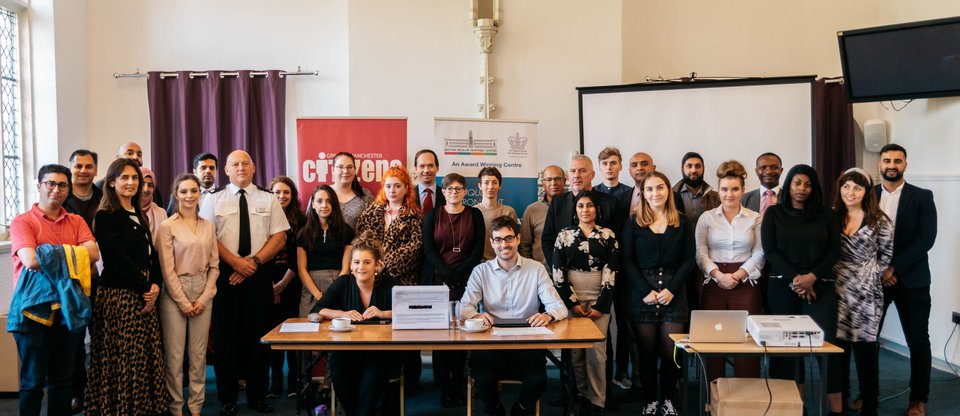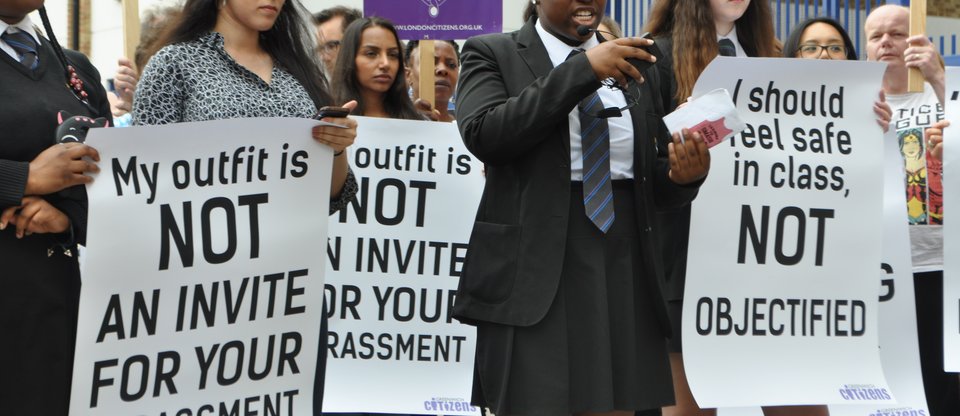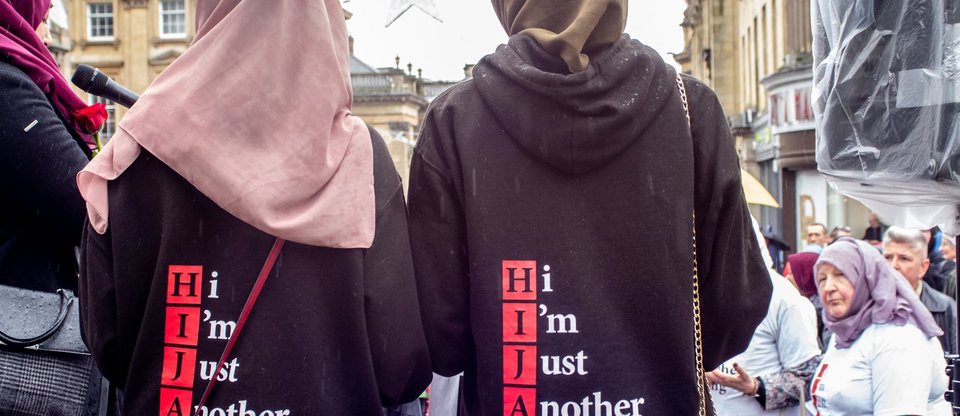The path to making misogyny a hate crime
The path to making misogyny a hate crime
Four hundred people packed into a room in Nottingham Trent University in March 2015.
They were from all walks of life – Muslims, Jews, the LGBTQ community, disability rights groups, students and many more. Leaders from all these communities were on stage, united as a team, and negotiating with two politicians: the Police Crime Commissioner, Paddy Tipping, and Nottingham Councillor, David Liversidge. What were they there for? Primarily to launch the Nottingham Citizens Hate Crime Commission. But they were also there to ask Nottinghamshire Police to do something no other police force in the country had done before: to recognise misogyny as a hate crime.
Mel Jeffs, Manager of the Nottingham Women’s Centre, stood up at one point and said: “You’ve read our report. We are all united behind this. Will you commit to ensure that misogyny is treated as a hate crime?”
In front of 400 people from many different backgrounds and the local media, it’s hard to say no. That was a moment of social change.
By July 2016, Nottinghamshire Police became the first force in the country to start treating misogyny as a hate crime. By November 2020 seven police forces across the country now recognise misogyny as a hate crime. Alongside this, the Law Commission have recommended that gender and misogyny be protected under hate crime law.

How did this happen?
Self-interest. It’s the best way to analyse how that story worked out like it did. Those with strong values who want to make the world a better place, tend to be uncomfortable with the idea of self-interest. Surely social change is made by people who are selfless people who care only for others?
No! People, with rare exception, act according to what they need and want. Also, within Community Organising, it is one of the only ways to really engage people.
Sajid Mohammed came to Nottingham Citizens angry and looking for help. His wife had been abused in a supermarket on Mother’s Day, and his children put at risk of harm. His own life had been threatened in the centre of Nottingham. He wanted to protect himself and his family. While Sajid, like any of us, believed that all sorts of positive things ought to happen in Nottingham, it was the fact that he had had a personal experience that threatened his security that moved him to action.
He wanted the police to do more, but he knew that to make that change, he needed others. He needed more power. Working with the Community Organiser in Nottingham, he mapped out who else would be worth speaking to, who might have an interest in a stronger response to hate crime in Nottingham, and started to have conversations with these people.
Muslims, disabled people, women, members of the LGBT community – all came together because they had experience of hate crimes. How did they manage to weave these different people together into common action? Here the Community Organising method came to play. The first half of the meeting was one long round of introductions, with two questions:
- Give a personal story of hate crime you or someone close to you has experienced and how it made you feel?
- How many people does your organisation represent in Nottingham?
The first question draws out self-interest. People started to share stories of being shouted at, spat at, barged into, wolf whistled at and followed. And though their respective identities were very different, the feelings of fear, shame, anger and powerlessness were the same. Those things are human experiences and they cut through the stereotypes that we build up about people who we don’t know.
And the second question about numbers of people in your community helped to build power. There’s no point in getting people to share their pain like that unless there is the potential to do something about it. And if you want change, you need power. And if you want people to act, they need to believe that it might work.
By working together, this group of people began to see that they could do something together that they couldn’t achieve on their own. That meeting kicked off a community-led inquiry involving 1,000 conversations about people’s experiences of hate crime. A huge amount of energy was built up through those conversations and that meant that by the time the report and recommendations were launched, there were 400 people in the room to back it.
Finding common self-interest can move people over the barriers of prejudice into coalition, over the barriers of apathy into action. It’s in the practice of democratic activity that, on an individual and a community level, we learn to work with others who are different to us.
Why did they win?
The answer as ever lies in power and self-interest. There were 400 people in the room, the community research had involved 1,000 people and the combined membership of Nottingham Citizens is 50,000. Covering the event were the Nottingham Post with a circulation of 18,000 and the BBC news show East Midlands Today with viewing figures of 325,000. Paddy Tipping and Dave Liversidge are both politicians and politicians want votes. Turnout matters and numbers count.
Politicians do care about reputation and votes, but like all of us they have stories, experiences and values that we can understand and connect to. Relevant to this campaign, Paddy Tipping had previous professional experience as an MP involved in setting up the Stephen Lawrence Inquiry concerning the police response to a murder of a young Black man in South London.
If you want change, you need power
You build power through relationships with other people and those relationships are built around mutual self-interest. Now, power and self-interest might sound uncomfortable but it’s through this lens that we can best understand how politics works and with these levers that we can start to make change happen ourselves.

Sign up now if you care about making misogyny a hate crime and we will let you know about the different ways you can help.





